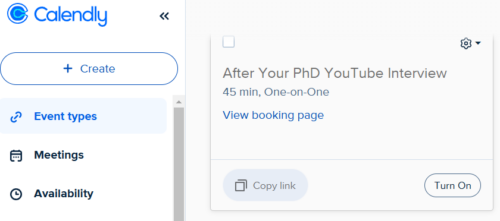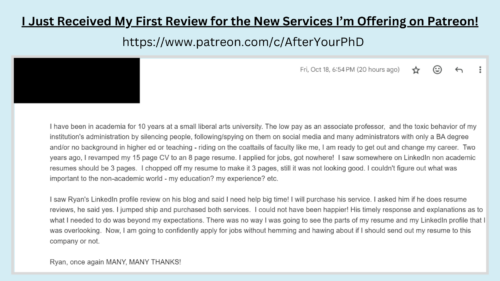Informational interviews are a powerful way to connect with professionals and expand your network. Learn how to make the most out of the networking strategy by reading my tips and strategies based on my personal experience as a former academic turned SEO professional.
What is An Informational Interview?
An informational interview is a conversation where you meet with a professional in a field or role you’re interested in to gain insights and advice.
Key to having a successful informational interview is being interested in who you are talking to. If you go into the process with a list of questions but little real interaction, it will likely not be beneficial for either party.
Leaving academia means being more curious about people than research topics. Get to know people, learn about how they got to be where they are now. Networking takes time, but it will transform your professional career for the better. #altac
— After Your PhD (@afteryourphd.bsky.social) December 15, 2024 at 10:12 PM
Scheduling The Informational Interview
#1 – Build Out Your LinkedIn Profile or Portfolio
Before you begin the initial outreach message, I recommend building out a profile on social media platforms like LinkedIn, BlueSky, or whatever channel you plan to contact someone before sending the first direct message.
By creating and optimizing your LinkedIn profile, you give the person seeing your message some important context that goes beyond the message and shows that you are a real person and not just a blank profile.
Having this context can be helpful for other PhDs because the person you are potentially speaking with may have a similar academic background. For instance, most of my informational interviews in my pivot were from other academics because they had first-hand experience of how hiring managers perceived PhDs.
#2 – Do Your Research To Find Others To Interview
Once your profile is created, take some time to determine the types of career paths that interest you in a broad sense. Not doing so can make the informational interview process feel wasted. For example, if you are transitioning from academia and want to work in data science, talking to people with sales degrees might not be the best fit.
I also find that knowing more about the person before the interview can make you stand out. Knowing about their past dissertation topic or their research interests while in graduate school could be a good way to connect.
#3 – Be the First To Request An Informational Interview
Don’t wait for someone to ask for an informational interview. Take the initiative and request an informational informational.
Knowing what to say can be one of the more difficult parts of networking. I tend to keep my prompts simple and avoid wasting their time. Ask that you found them on LinkedIn for example and then talk about your motivations for setting up an informational interview. You can use ChatGPT to create templates if you need additional assistance. You can use my edited ChatGPT template below.
Informational Interview Request Template
Hi [Recipient’s Name],
I’m currently transitioning into a career in [field] and came across your experience on LinkedIn.
I’m interested in learning more about your path into [specific role/industry].
If you’re open to it, I’d love to schedule a brief 20-30 minute chat to hear more about your experience. Here’s my Calendly below if you’d like to schedule an interview.
I greatly appreciate your time and any guidance you might be willing to share.
Thank you for considering my request—I look forward to hearing from you!
Best regards,
[Your Name]
#4 – Use Scheduling Tools To Make the Process Easier
One of the lowkey ways to speed up scheduling is putting your best foot forward and having your own scheduling tool to have open times. When an interviewee can simply select their time slot on their own time, the process is much easier and faster with little back and forth.
I use Calendly, but there are also other scheduling tools on the market you could use like Google Meet or Doodle.
In most cases, I just grab a link from Calendly and share the link in the direct message.
Note: Timezones can make things difficult if you don’t plan accordingly.
Below is an example of a Calendly. I use it to schedule guests for the After Your PhD YouTube channel.

#5 – Be Sure to Follow Up
Similar to formal interviews, it doesn’t hurt to follow up with people. There are several people that I keep in touch with now and again and my talks didn’t end up with a formal interview.
Try waiting a few days and mentioning that they feel more confident in your career path (if that’s the case) and if they would suggest any other folks to talk to.
If the end goal was having a genuine connection or professional contact, then you were successful in the informational interview process.
#6 – Try To Schedule Another Informational Interview
Don’t stop after the first informational interview. Use what you learned from the informational interview to refine the process and get more confident in the interview process. If you are shy or an introvert, then informational interviews give you additional interviewing practice for the real thing!
Support After Your PhD on Patreon!
Hope this helped! If you like this content or the other work I do on social media, support me on Patreon! You can support After Your PhD for as little as $2 a month, or you can directly hire Ryan Collins PhD for LinkedIn Review and Resume Services.


Ryan Collins PhD is an SEO Strategist at Go Fish Digital. Ryan completed his PhD in Media Arts and Sciences at Indiana University Bloomington in 2021. During his time at Indiana University, Ryan eventually pivoted into a career in SEO and Digital Marketing after having informational interviews with working professionals in SEO, working on side projects, and gaining industry experience.
